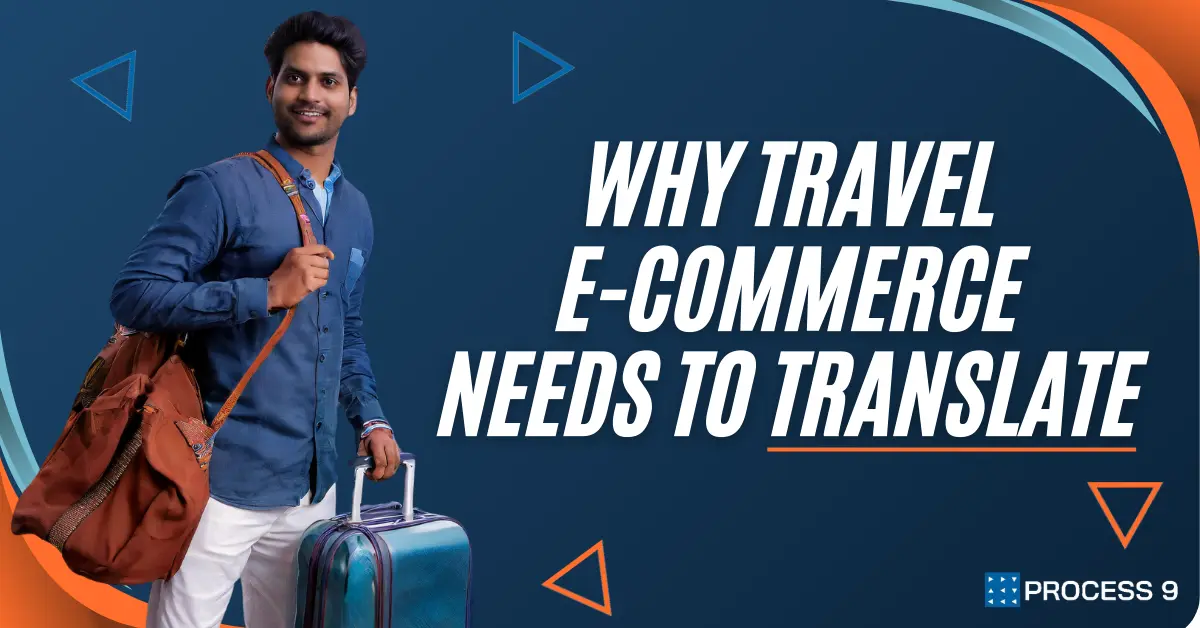In the dynamic landscape of the e-commerce industry, travel e-commerce businesses have been showing consistent growth and resilience. Even though COVID- 19 had posed some challenges, the online travel industry has shown tremendous tenacity. The size of the online travel market is anticipated to reach USD 28.4 billion with a compound annual growth rate of 10.5% by 2029, according to Mordor Intelligence. Some of the latest statistics reveal that the cart abandonment rate of travel e-commerce is higher than general e-commerce and is up to 87.9%. With diverse audiences using travel e-commerce platforms, the need for effective communication becomes more paramount. In this blog let’s explore how translation acts as a linchpin in bridging linguistic barriers and fostering better customer engagement in the travel e-commerce industry

What is travel e-commerce?
Travel e-commerce refers to the buying and selling of travel-related products and services through websites and mobile applications. This includes booking flights, hotels, rental cars, tours, and other activities. Some major travel e-commerce platforms in India include MakeMyTrip, yatra, ClearTrip, booking.com, etc. They are also known as online travel agents or OTAs. The travel e-commerce platforms provide comprehensive information, reviews, multiple secured payment options, etc. Some of the highlights of travel e-commerce websites are,
- Customer convenience
- Competitive Pricing
- Loyalty incentives and reward programs
- Search and filter functionalities
- Multiple secured checkout options
Travel e-commerce is a growing industry, and affordable smartphones, increased internet usage, and faster payment options have encouraged customers to use more of these platforms.
Importance of translation in travel e-commerce
Any customer who logs into an online travel e-commerce platform expects details good enough to make an informed choice. Since multiple travel e-commerce platforms are available online, one that provides useful insights to clients will gain their loyalty. You will undoubtedly gain a competitive edge in the marketplace by providing them with information in a language of their choice and considering their likes and preferences. Customer can connect better if your content is localized in consideration of their linguistic and cultural preferences. Language barriers can be overcome and improved customer-provider communication can be established with the aid of effective translation. By offering multilingual content that resonates well with customers, you build customer trust and credibility and provide them with an enhanced user experience.
What are the challenges in travel-commerce localization?
The travel-related content is diverse in nature, ranging from hotel descriptions, to tour itineraries, etc. These kinds of content demand a nuanced translation. With new travel-related services and destinations coming up all the time, an agile translation process is necessary to keep up with the constant influx of new content. The translation workflow becomes even more complex due to the constant changes in fields like price, availability, etc., and updating content across all languages can be even more difficult. Moreover, handling the complexities of local laws, currency conversions, preserving terminology consistency, etc. can be difficult when translating travel e-commerce content.
Success stories of translation in travel companies
MakeMyTrip

One of the biggest Online Travel Agencies (OTAs), MakeMyTrip, partnered with Process Nine Technologies to localize their digital platforms. Every quarter MakeMyTrip has seen a significant influx of around 40% new users from Tier2 and Tier3 cities. By embracing Localization As a Strategy (LAAS), they enunciated the importance of including regional languages in their rail as well as flight booking segments. With features like the ability to book flights and trains in Indian languages, MakeMyTrip has demonstrated its commitment to helping customers who prefer to make purchases online in the language of their choice.
Railyatri
The Railyatri app which offers details on train travel and the ability to book tickets is now accessible in eight Indian languages. The app is targeted at Indian vernacular users, who are becoming more prevalent in the digital sphere. According to Manish Rathi, CEO and co-founder of RailYatri, this app is not only made in India but also made for Bharat users. As a brand, Railyatri caters to BHARAT users, who make up more than 75% of the audience and prefer using their native tongue for browsing or communication.
Process Nine- Your trusted partner in travel e-commerce localization
The language technology solutions of Process Nine offer a comprehensive and context-sensitive localization experience. MoxVeda, a localization platform developed by Process Nine, allows travel e-commerce websites and apps to be effectively tailored to the language preferences of their users. Our highly scalable localization methods can accommodate high traffic volumes, ensuring efficiency and accuracy. With MoxVeda you can generate high-quality translation outputs that can resonate well with the nuances of your sector while maintaining linguistic and cultural relevance. With AI-powered translation of your digital assets using MoxVeda, you can enhance your customer experience, promote ease of use across all interfaces, and improve communication and engagement.
Schedule a consultation today and begin the transformation of your travel e-commerce platform into a global destination.







Share: